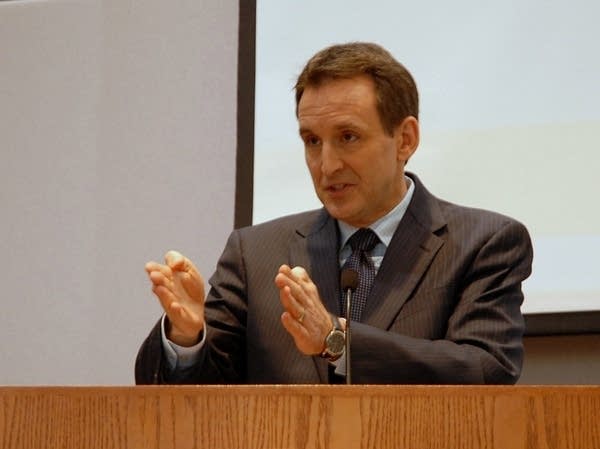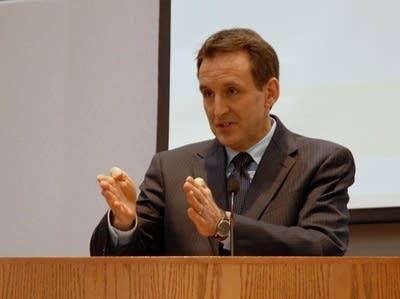Minn. lawmakers probe, pan Pawlenty's budget plan
Go Deeper.
Create an account or log in to save stories.
Like this?
Thanks for liking this story! We have added it to a list of your favorite stories.

The governor's plan for erasing a projected $4.8 billion budget deficit reduces or delays state spending, borrows money through the sale of bonds and relies heavily on an economic stimulus check coming from the federal government. A week after the proposal's release, members of the Senate Finance Committee got to weigh in with sometime harsh reviews.
"I mean, you can either die with a bloody ax or a million paper cuts. Which way do you want it?" asked Sen. Steve Murphy, DFL-Red Wing.
Murphy described the governor's budget as one of the most disappointing he's ever seen. He is particularly concerned about the governor's proposed tax cuts for businesses and the use of one-time money, that he said would leave the state with another big budget hole in two years.
Murphy said he supports raising taxes, but he's not sure which ones. He said he wants an honest budget with no gimmicks or shifts.
Turn Up Your Support
MPR News helps you turn down the noise and build shared understanding. Turn up your support for this public resource and keep trusted journalism accessible to all.
"And that way the people in the state of Minnesota will know exactly how bad the ox goring is going to get," he said. "Because everybody's ox is going to get gored."
Murphy directed his criticism toward Management and Budget Commissioner Tom Hanson, who presented a budget overview to the committee. Hanson defended the governor's budget and the use of one-time money, saying these are not ordinary times.
"The need to help people push as much money out into the economy as possible is critical," he said. "That is why you see a shift. That's why you see the appropriation bonds. We are trying to cushion the people of our state from bad economic times."
Hanson was also defending a complicated borrowing plan, that would use revenue from the state's tobacco lawsuit settlement to pay of the debt.
Sen. Ellen Anderson, DFL-St. Paul, said the state should not use one credit card to pay off the debt of another card.
"I don't see it as a responsible long-term better way than what we're seeing in Washington, in terms of deficit spending," she said. "I think we're starting to go down that road. I mean it's not exactly deficit spending, but borrowing against borrowing is not a good road to start going down."
Another commissioner was on the budget-hot seat in a House committee hearing. Dan McElroy of the Department of Employment and Economic Development answered questions from the Bioscience and Workforce Development Policy and Oversight Division about job creation. He also explained the governor's proposal to cut the corporate tax rate and provide other tax breaks for businesses.
Some Democrats are skeptical about the plan, but Rep. Joyce Peppin, R-Rogers, said it's time for DFL leaders to roll out their own budget proposal.
"In every committee I've been in, all I've heard is the governor is wrong on the corporate tax cuts. The commissioners are wrong on their decisions. And I think that's a fair discussion. I think it's fair to ask those questions," she said. "But I also think it's fair to give us a timeline to when we can expect the budget from the majority party, and when we can put them side by side and get busy as a state and fix this budget problem, and not just complain about what the governor has had to do."
The Republican governor's budget plan doesn't include any tax increases. DFL leaders say they're not ruling them out, but they've been careful not to use the T word.
In the House higher education committee, Rep. Tom Rukavina, DFL-Virginia, paused from the testimony of financially-strapped college students to declare that the way he sees it, there's no way to reach a final budget agreement without an increase in tax revenue.
"Tax the fairest way, which is based on income and those who make it," he said. "Because there are people that make income even when there's a huge recession going on. There are people that are make money. So that's the way I would do it. But I understand that at least half of that $5 billion has got to be done with cuts."
DFL leaders say they want to give Minnesotans a chance to weigh in on the budget debate. Lawmakers will fan out across the state in two weeks. They plan to hold town hall-style meetings in 13 cities on February 19 and 20. A second series of meetings is planned later in the month.
Dear reader,
Political debates with family or friends can get heated. But what if there was a way to handle them better?
You can learn how to have civil political conversations with our new e-book!
Download our free e-book, Talking Sense: Have Hard Political Conversations, Better, and learn how to talk without the tension.




